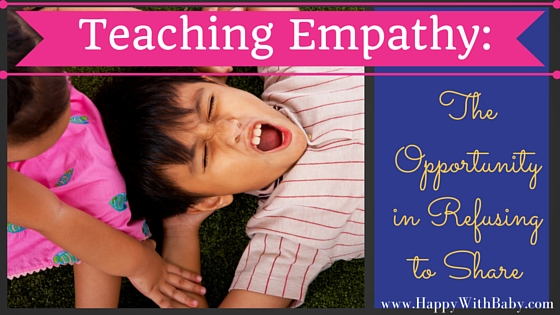Teaching Empathy: The Opportunity in Refusing to Share

My daughter loves her older brother.
She really adores him and I love to watch their sweet interactions together. Whatever he does she wants to do. This includes doing silly things, eating foods, making their beds, showing off some recent talent. This also includes wanting to play with all his toys--something he’s not always a fan of.
I sometimes find myself telling him, “Just let her play with it!” as I hear him start to yell at her to stop.
“Don't yell at her!” I scream from the other room. Talk about sending mixed messages.
And, maybe what’s most interesting about these situations is that we consider the importance of learning to share to be a no-brainer, but what about the importance of listening to each other and communicating our feelings?
So, I've actually been trying something different recently, or at least more consistently, I should say:
I've just been trying to empathize with him. Yes, really. Empathize with him! So when he is frustrated because she's playing with his toys and is messing up whatever game or activity he has going on for himself, instead of telling him to stop and just play with her (not what a child ever wants to hear), I just validate how frustrated he must be.
Somehow magically at times it seems to stop him in his tracks. Sometimes he walks over and just gives me a hug.
Interacting with him this way is teaching him a lot of different, but important things:
-
It shows him that his feelings are valid.
-
It allows him a space to share and voice his frustrations.
-
It lets him know I’m here for support.
-
It gives him an opportunity to ask for what he needs. I don’t solve the problems for him, but if needs my help he know he has it.
The added bonus is that my daughter often witnesses these moments, and by default, she has the opportunity to learn:
-
It shows her how to listen to others.
-
It teaches emotional intelligence. She’s learning what both frustration and empathy look like.
-
It assures her that, when she’s frustrated, she can count on mom to listen and support her too.
Now, I bet you want to know if the conflicts have stopped.
No, I have to admit, he hasn’t stopped yelling entirely--he is only 6. But, there are times I hear him trying to explain his frustrations to his sister (Let me tell you it’s the cutest darn thing to hear). There are also times when he comes to me to share his feelings (Yes, this momma hopes that this never ends). And then, of course, there are still times he just yells at her (Hey, what can I say, it’s progress).
It’s my job as a parent to help him to self-soothe and use his words to share his feelings appropriately.
How do you handle things when your kids fight? Share your tips or questions in the comments or email me directly.
Subscribe
Sign up to get the latest weekly blogs sent straight to your inbox


1 comment
Leave a comment
Please log in or register to post a comment